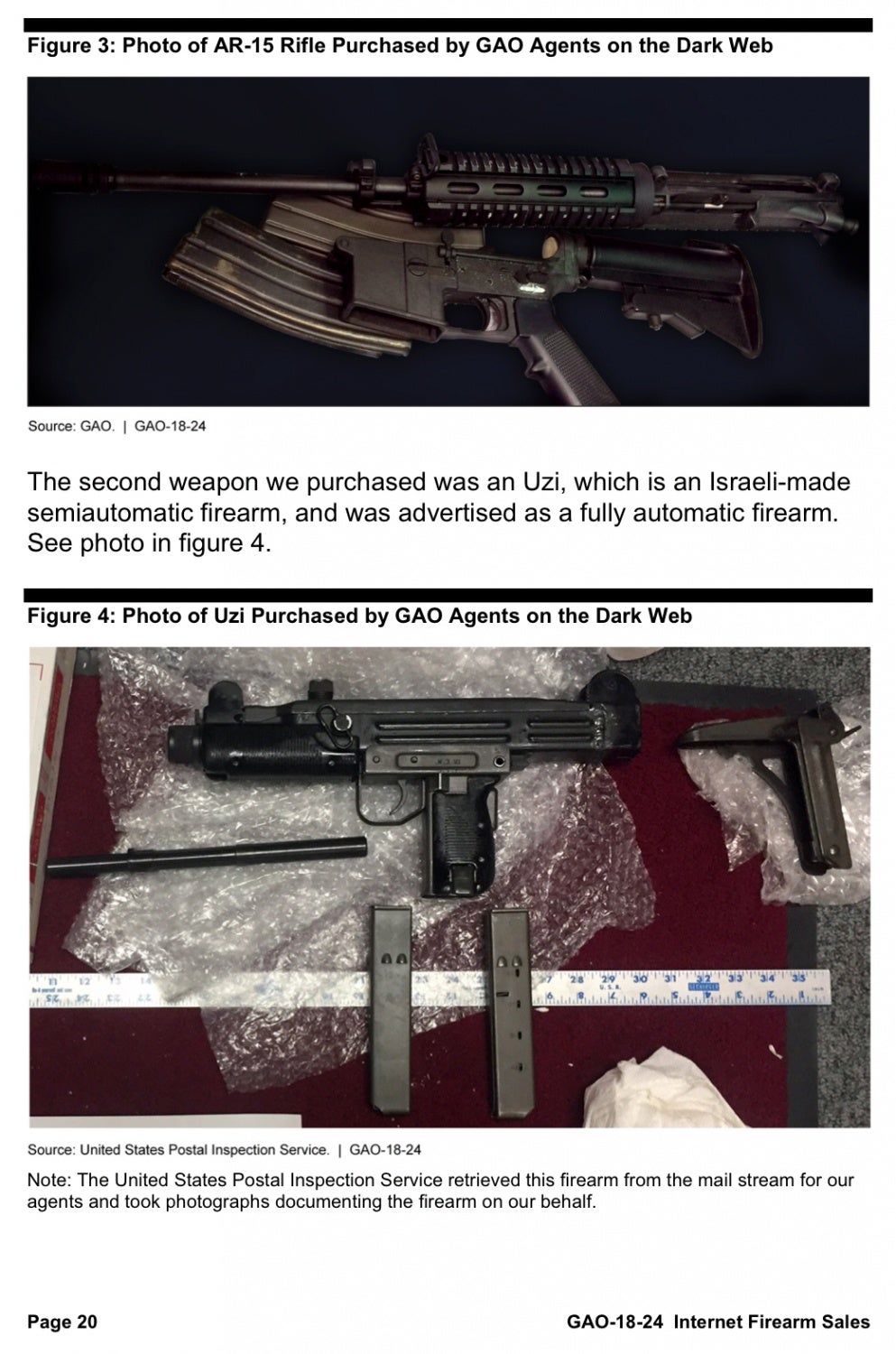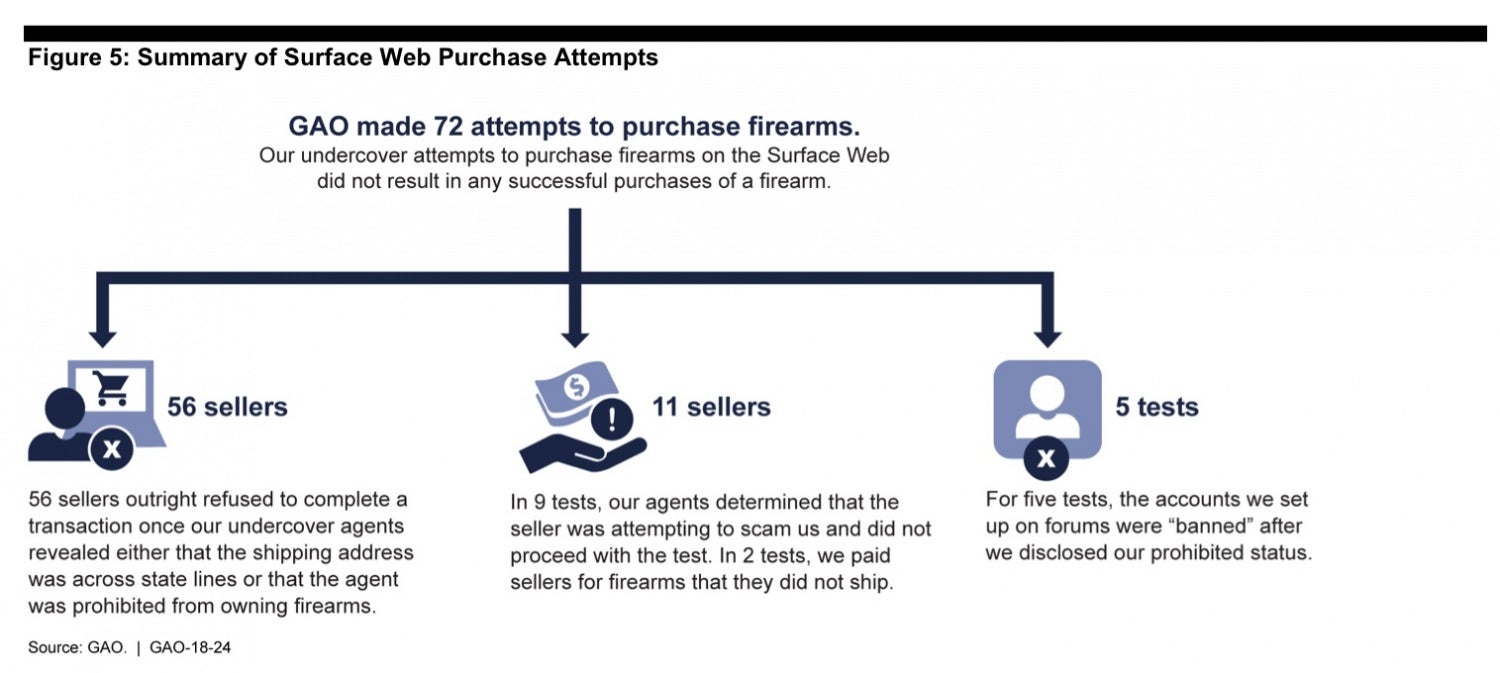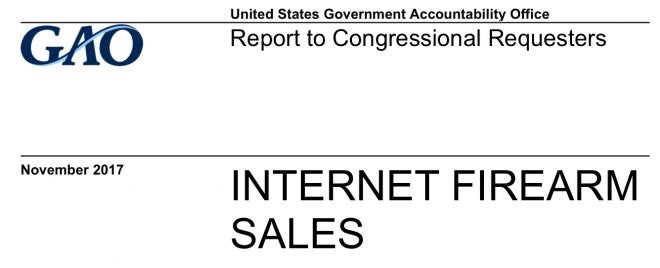Last year the Government Accountability Office (GAO) requested law enforcement “covert testing” of internet firearm sales, including the use of Dark Web hidden service forums and marketplaces, in an attempt to identify potential issues. In the course of the study, agents from the Bureau of Alcohol, Tobacco, Firearms, and Explosives (BATFE) attempted to purchase firearms from different sources on the internet, after announcing they were a ‘prohibited person’ as defined by U.S. Law.
Using Open Web (standard internet websites) outlets like forums, social media, and e-commerce sites, the investigation was unable to make a single firearm purchase. Using Dark Web marketplaces, investigators were able to purchase firearms twice, even after notifying the seller of their legal inability to buy or own a gun. The two examples included an AR15 with an obliterated serial number and an Uzi that was reportedly converted to be capable of automatic fire – both of which are already either illegal or regulated under federal law.
In my humble opinion, criminals willing to do criminal acts will continue to attempt to break laws or avoid regulatory hurdles to get what they want. In the case of guns, this means stealing, buying under false pretenses, fraud, forgery and any other federal violations to make a purchase. The internet as a form of facilitating Commerce is not immune from criminal behavior – the GAO testing outlined below is the equivalent of asking banks if criminals use the internet to steal money.
Not one Open Web source agreed to sell a firearm to a potential restricted person in the course of the study and neither the GAO nor the ATF offered any conclusions at the end of the report. I can’t tell if the results are interesting or completely insignificant. I’ll let you decide.
Excerpts from the report as well as links to the full text can be found below.
INTERNET FIREARM SALES: ATF Enforcement Efforts and Outcomes of GAO Covert Testing
From pages 2-3 of the GAO report:
“The current federal legal framework of statutes and regulations governing the buying and selling of firearms does not specifically address the use of the Internet to facilitate these transactions. Federally regulated transactions include those in which the seller is engaged in the business of dealing in firearms and is required to conduct a background check on a prospective nonlicensed buyer. Conversely, private transactions for the most common types of firearms between nonlicensed individuals who are residents of the same state, including transactions facilitated by the Internet, are generally not subject to federal background-check requirements.
You asked us to assess the extent to which ATF is enforcing existing gun laws as they apply to firearms transactions facilitated by the Internet and investigate whether online private sellers sell firearms to prohibited individuals. This report describes (1) techniques ATF uses to investigate and enforce generally applicable firearm laws in instances where the firearm or firearm-component transaction is facilitated by the Internet and (2) results from our covert attempts to buy firearms on the Surface Web and Dark Web.”
“Agents Purchased Two Firearms on the Dark Web, but Covert Attempts to Illegally Purchase Firearms on the Surface Web Were Unsuccessful”

From pages 19-20 of the GAO report:
“Our agents successfully purchased two firearms from sellers we located on a Dark Web marketplace as a result of seven total attempts. ATF officials stated that the Dark Web is completely anonymous and is designed to facilitate criminal activity online. Further, an ATF report states that most used firearms are sold via the online auctions, online marketplaces, and on the Dark Web as compared to the Surface Web. In the seven attempts, our agents did not disclose any information indicating they were prohibited from possessing a firearm. In the five attempts where we did not ultimately purchase a firearm, the prospective seller stopped responding to our inquiries, stated the firearm was no longer for sale, refused to use an escrow account for payment, or experienced technical problems using the Dark Web marketplace. The first weapon that we purchased was an AR-15 rifle, which is a semiautomatic firearm. The serial number on the firearm was obliterated.
The Dark Web seller shipped the dismantled weapon directly to the undercover address provided by our agent. It is unlawful for any person to possess or ship in interstate commerce a firearm which has had the importer’s or manufacturer’s serial number removed, obliterated, or altered, if the individual had such knowledge about the serial number. Additionally, because the firearm was shipped across state lines, the seller may not have been a resident of the same state as our agent. We did not confirm whether the seller notified the shipping company that the package contained a firearm. Any of these circumstances—removing a serial number, selling to a resident of a different state, or failing to properly notify the shipping company that the shipment contained a firearm—if proven, would likely violate federal law. A photo of the weapon can be seen in figure 3.”
“All of Our Attempts to Illegally Purchase Firearms from Private Sellers on the Surface Web Were Unsuccessful“

From pages 21-22 of the GAO report:
“Our covert testing involving GAO agents attempting to purchase firearms illegally on the Surface Web were unsuccessful. Specifically, private sellers on Surface Web gun forums and in classified ads were unwilling to sell a firearm to our agents that self-identified as being prohibited from possessing a firearm. In our 72 attempts to purchase firearms from private sellers on the Surface Web, 56 sellers refused to complete a transaction once we revealed that either the shipping address was across state lines or that we were prohibited by law from owning firearms. The scenarios we applied to the purchases were derived from provisions in the GCA.
The five scenarios disclosed status information that would disqualify our agents from purchasing a firearm. For example, in one scenario we stated that we were a convicted felon; in another scenario, we informed the seller that we had a dishonorable discharge from the military. In these 56 attempts, 29 sellers refused because they would not ship a firearm and 27 refused after we presented the scenario. Furthermore, in five of these attempts, the accounts we set up on several forums were frozen by the websites, which prevented us from using them after we disclosed our prohibited status or requested interstate shipment and attempted to make a purchase.
In the 11 remaining attempts, we encountered private sellers that appeared to have scammed us, or attempted to scam us, after we disclosed our prohibited status or asked to avoid using an FFL. In two of these instances, we made a payment and never received the firearm or a refund. In the remaining nine attempted scams, our agents determined that the seller may not be legitimate and therefore did not complete the purchase.
For example, in one attempt, the agent conducted investigative research on the seller and found evidence suggesting that the seller may be involved in online fraud. As a result, the agent did not follow through with the purchase attempt. ATF does not have jurisdiction over fraud cases so, when it encounters such circumstances, the agency may refer the case to the Joint Support and Operations Center or to local or state law-enforcement agencies or may encourage the victim to file a police report. The results of our attempts on the Surface Web are summarized in figure 5.”
All information referenced in this story is sourced from INTERNET FIREARM SALES
ATF Enforcement Efforts and Outcomes of GAO Covert Testing – Published in November 2017
 Your Privacy Choices
Your Privacy Choices
